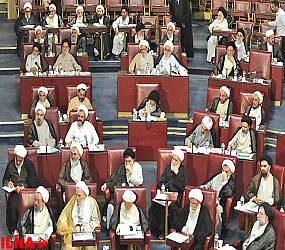Tuesday, August 24, 2010
|
Home
>
Radio Zamaneh in English
>
Latest News
>
Assembly of Experts follows Ayatollah Khamenei's lead
|
Assembly of Experts follows Ayatollah Khamenei's lead

heads of the Assembly of Experts
The Assembly of Experts, a body of 86 Islamic scholars in charge of electing, supervising and dismissing the supreme leader in the Islamic Republic, met for the sixth sessions of its fourth term. Ayatollah Rafsanjani, the chairman of the assembly, was the main speaker of the meeting.
Hashemi Rafsanjani, who aligned himself with the opposition in June by demanding a re-count of the votes of the presidential elections and by challenging Mahmoud Ahmadinejad’s victory, spoke diplomatically today without making any references to the election.
While following the violent treatment of protesters in the post-election events several Shiite clerics specifically called on the Assembly of Experts to re-examine the suitability of supreme leader Ayatollah Khamenei, who had endorsed the hostilities, Mr. Hashemi Rafsanjani made no such attempt and in fact emphasized the obligation of every one to follow the guidance of the leader.
Ayatollah Rafsanjani made no reference to Qods Day protests and merely lauded the “grand presence of people” in the march and remarked that the Leader was also satisfied with the “unified presence of people” in the event.
Ayatollah Rafsanjani’s remarks were in contradiction to the presence of tens of thousands of protesters who marched with their green accessories to distinguish themselves from the usual anti-Israeli march organized for the day.

Assembly of Experts
Chairman of the assembly went on to point out the “significant” nature of the internal issues facing the government and advised that with “some pause and tolerance everything can be redirected toward better ends if matters are evaluated with care and decided upon in time.”
Ayatollah Rafsanjani declared there has never been any division between the system and senior clergy in the past and expressed his wishes that there will never be any such division in the future. Several Shiite clerics have openly condemned government treatment of protesters in the aftermath of the elections creating a deepening rift in the Islamic Republic system.
Ayatollah Rafsanjani made specific reference to the accusations made by defendants in the controversial mass trial of dissidents that has been condemned by human rights groups and moderate clerics as “show trials”. Since some allegations involved him and his family, he re-iterated the Leader’s comments on Sunday that no one should be allowed to make accusations without any proof.
He added that both officials and protesters have to stay in the framework of the law, otherwise they cannot be spared legal reaction.
The chairman of the assembly also announced that a group of “concerned activists of the system”, in accordance with the direction of the Leader, are in the process of devising a course of action that would clear the situation without any disturbances, and create a “properly critical and concerned” atmosphere.
In addition to Prosecutor-General who made a presentation on the state of internal altercations, chief of National Security Council reported on Iran's nuclear activities.
Ayatollah Rafsanjani in reference to Iran's nuclear negotiations, advised the use of diplomacy in stopping the West from taking "undesirable" decisions with regards to Iran.
|
|

